【精彩课堂】Unit3 Section B 单元写作课件(新目标九年级 Unit 3 Could you please tell me where the restrooms are)
文档属性
| 名称 | 【精彩课堂】Unit3 Section B 单元写作课件(新目标九年级 Unit 3 Could you please tell me where the restrooms are) |  | |
| 格式 | zip | ||
| 文件大小 | 3.2MB | ||
| 资源类型 | 试卷 | ||
| 版本资源 | 人教新目标(Go for it)版 | ||
| 科目 | 英语 | ||
| 更新时间 | 2023-09-20 09:41:27 | ||
图片预览

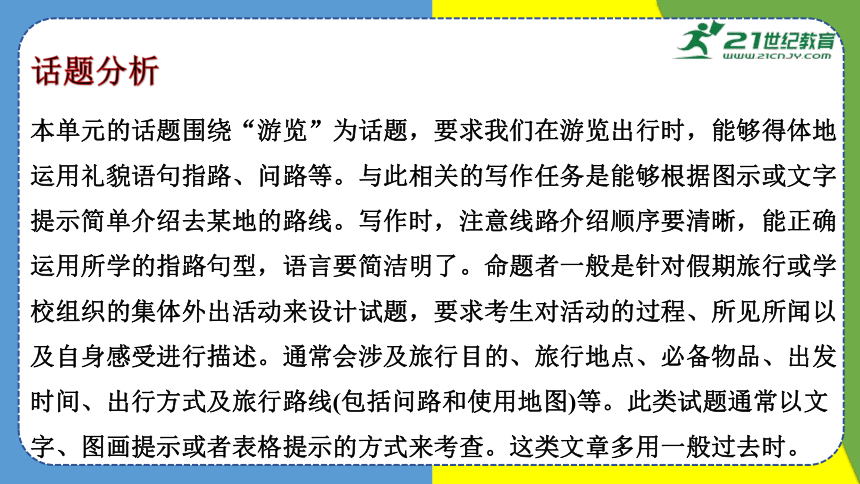
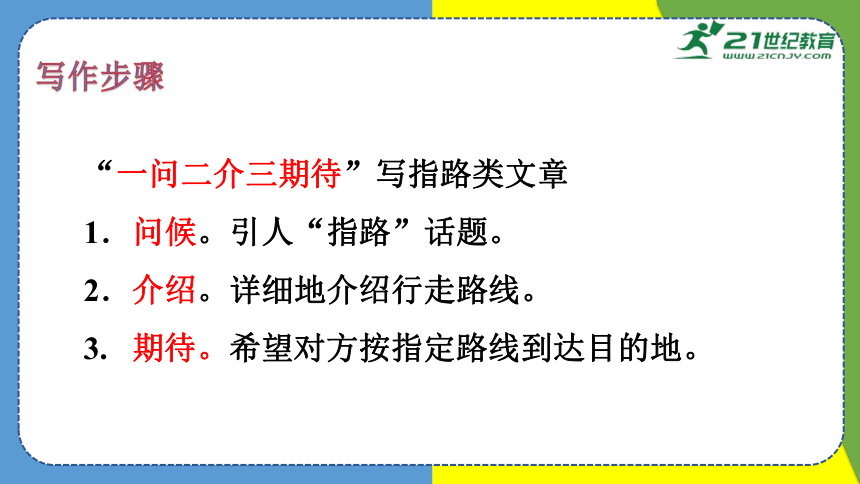
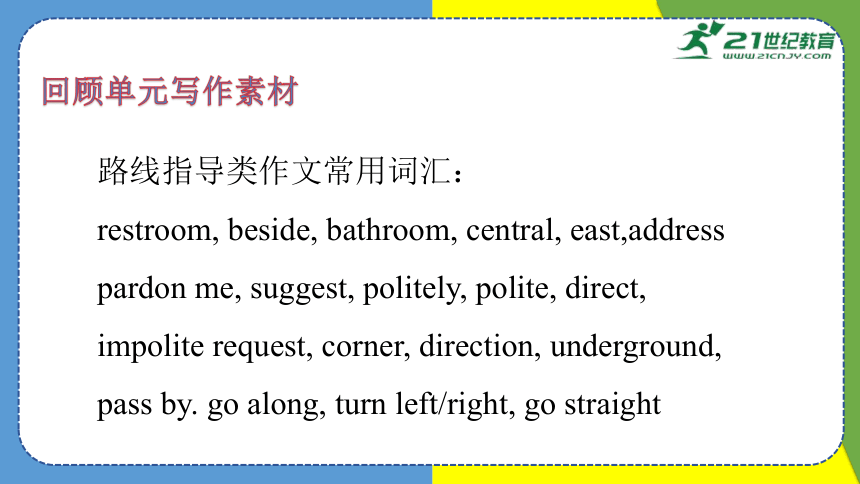
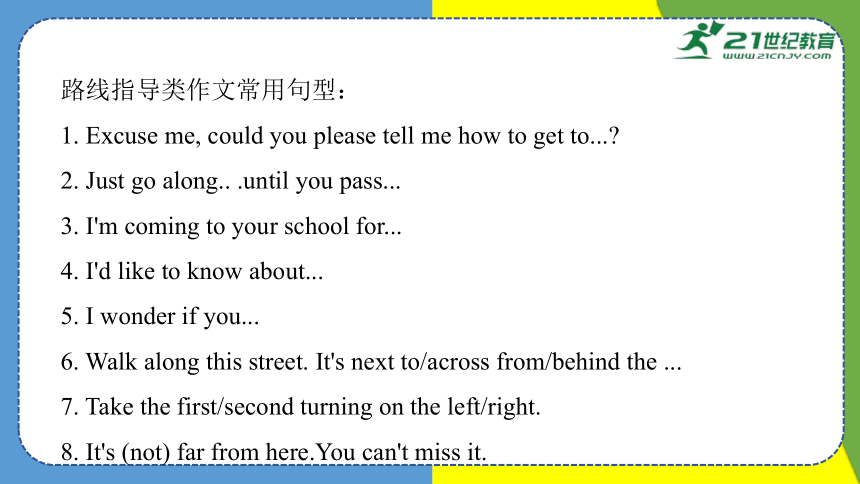
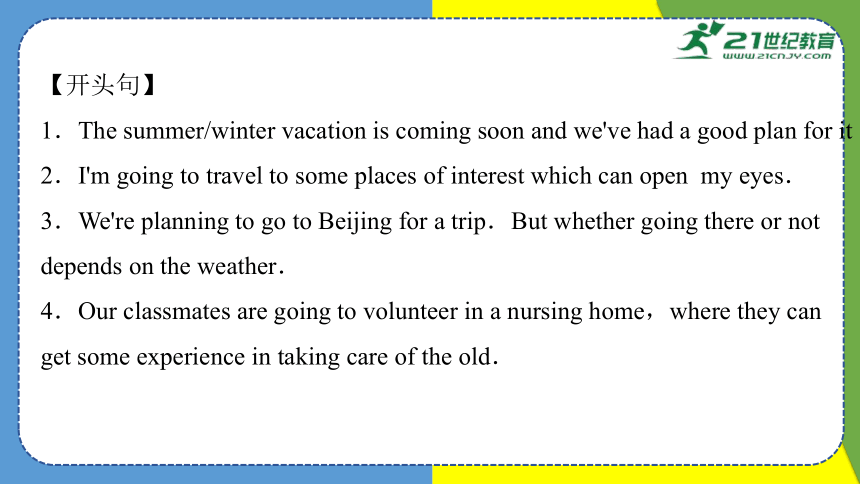
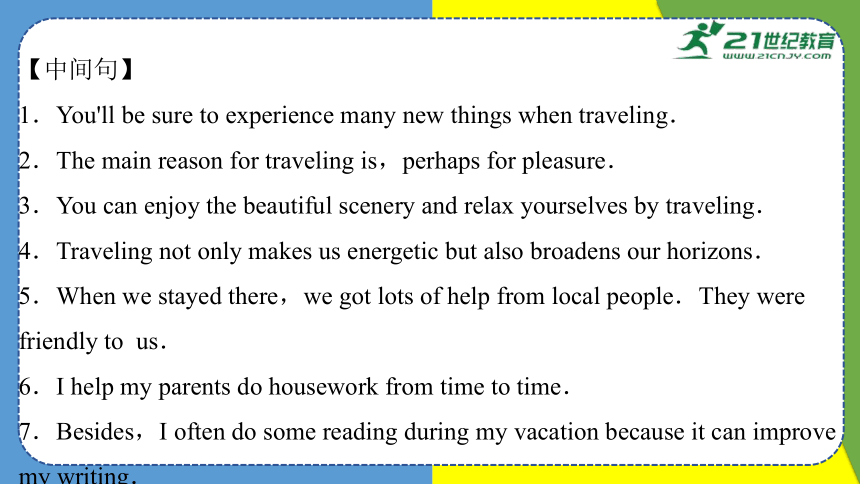
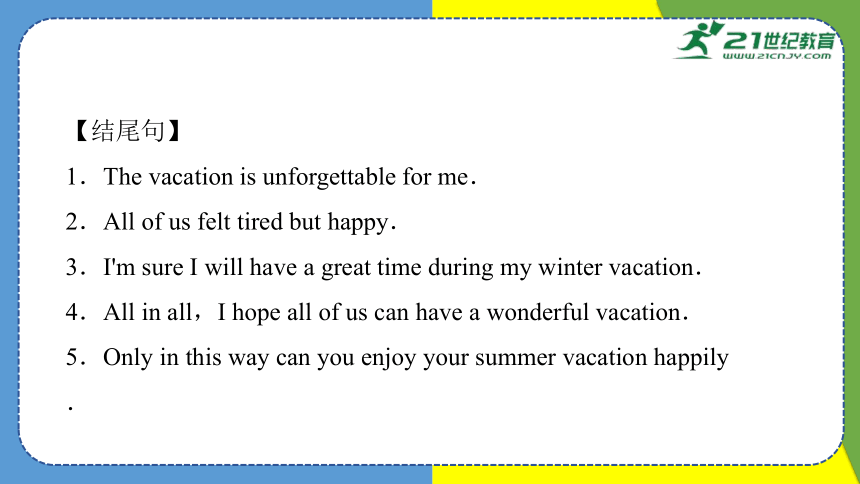
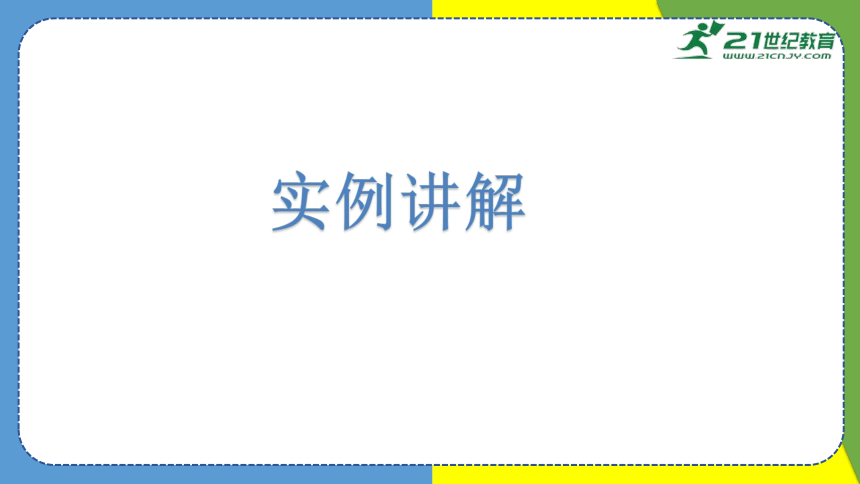
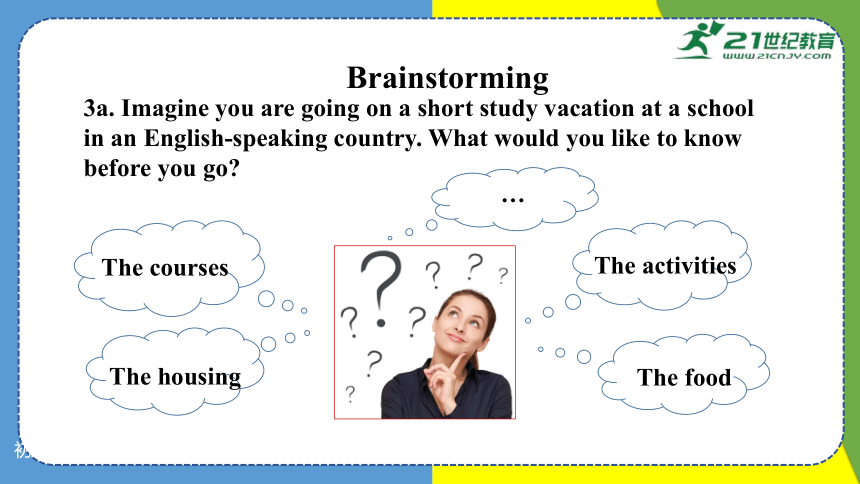
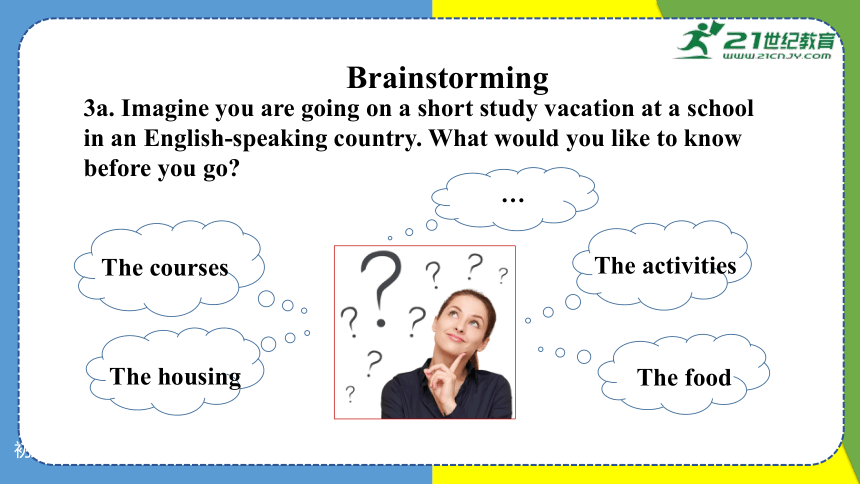
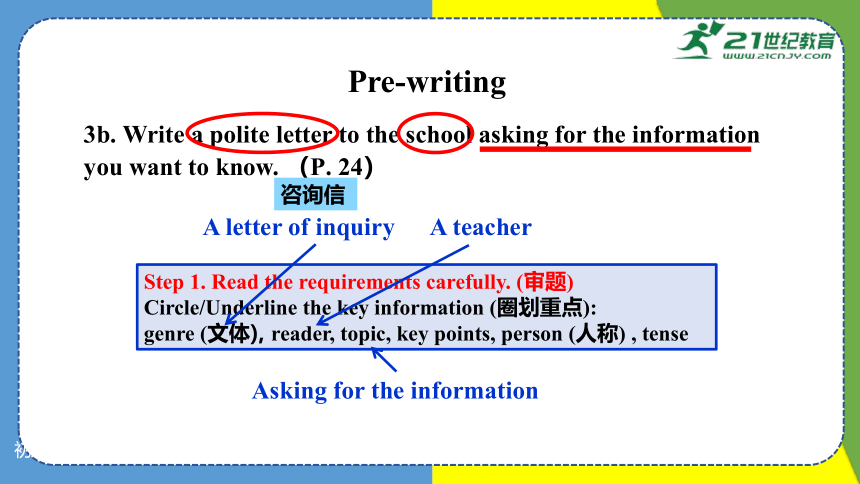
文档简介
(共57张PPT)
Unit 3
Could you please tell me where the restrooms are
单元话题写作
话题分析
本单元的话题围绕“游览”为话题,要求我们在游览出行时,能够得体地运用礼貌语句指路、问路等。与此相关的写作任务是能够根据图示或文字提示简单介绍去某地的路线。写作时,注意线路介绍顺序要清晰,能正确运用所学的指路句型,语言要简洁明了。命题者一般是针对假期旅行或学校组织的集体外出活动来设计试题,要求考生对活动的过程、所见所闻以及自身感受进行描述。通常会涉及旅行目的、旅行地点、必备物品、出发时间、出行方式及旅行路线(包括问路和使用地图)等。此类试题通常以文字、图画提示或者表格提示的方式来考查。这类文章多用一般过去时。
写作步骤
“一问二介三期待”写指路类文章
1.问候。引人“指路”话题。
2.介绍。详细地介绍行走路线。
3. 期待。希望对方按指定路线到达目的地。
路线指导类作文常用词汇:
restroom, beside, bathroom, central, east,address pardon me, suggest, politely, polite, direct, impolite request, corner, direction, underground, pass by. go along, turn left/right, go straight
回顾单元写作素材
路线指导类作文常用句型:
1. Excuse me, could you please tell me how to get to...
2. Just go along.. .until you pass...
3. I'm coming to your school for...
4. I'd like to know about...
5. I wonder if you...
6. Walk along this street. It's next to/across from/behind the ...
7. Take the first/second turning on the left/right.
8. It's (not) far from here.You can't miss it.
【开头句】
1.The summer/winter vacation is coming soon and we've had a good plan for it
2.I'm going to travel to some places of interest which can open my eyes.
3.We're planning to go to Beijing for a trip.But whether going there or not depends on the weather.
4.Our classmates are going to volunteer in a nursing home,where they can get some experience in taking care of the old.
【中间句】
1.You'll be sure to experience many new things when traveling.
2.The main reason for traveling is,perhaps for pleasure.
3.You can enjoy the beautiful scenery and relax yourselves by traveling.
4.Traveling not only makes us energetic but also broadens our horizons.
5.When we stayed there,we got lots of help from local people.They were friendly to us.
6.I help my parents do housework from time to time.
7.Besides,I often do some reading during my vacation because it can improve my writing.
【结尾句】
1.The vacation is unforgettable for me.
2.All of us felt tired but happy.
3.I'm sure I will have a great time during my winter vacation.
4.All in all,I hope all of us can have a wonderful vacation.
5.Only in this way can you enjoy your summer vacation happily.
实例讲解
Brainstorming
3a. Imagine you are going on a short study vacation at a school in an English-speaking country. What would you like to know before you go
The courses
The housing
The food
The activities
…
Brainstorming
3a. Imagine you are going on a short study vacation at a school in an English-speaking country. What would you like to know before you go
The courses
The housing
The food
The activities
…
Pre-writing
3b. Write a polite letter to the school asking for the information you want to know. (P. 24)
Step 1. Read the requirements carefully. (审题)
Circle/Underline the key information (圈划重点):
genre (文体), reader, topic, key points, person (人称) , tense
A letter of inquiry
A teacher
Asking for the information
咨询信
4. Thank the person for helping you
How can you write a letter of
inquiry
1. Introduce yourself
2. Say when you are coming
3. Politely ask for information
Step 2. Make an outline. (列提纲)
Person, tense, structure
Para. 1 Li Hua, 15, Beijing,
China, September
Para. 2 Courses, housing
activities, food
Para. 3 Thanks & reply
3b. Write a polite letter to the school asking for the information you want to know. (P. 24)
Pre-writing
While-writing
Use the following expressions:
My name is … and I’m from …
I’ll be coming to your school for … I’m writing to …
Step 3. Combine words into sentences and sentences
into a passage. (连词成句,连句成文)
1. To the point
2. Language: precise (准确的) , suitable, rich, logical
Para.1 Introduction & when
(Li Hua, 15, Beijing, China, September)
Linking words: firstly, secondly, in addition, what’s more …
Use the following expressions:
I’d like to know about … Could you please …
I wonder if you can … I’ll be grateful if you …
Para.2 Politely ask for information
(courses, housing, activities, food)
While-writing
Step 3. Combine words into sentences and sentences
into a passage. (连词成句,连句成文)
1. To the point
2. Language: precise (准确的) , suitable, rich, logical
Use the following expressions:
I would like to thank you for …
I’m looking forward to your reply.
Para.3 Thanks & reply
While-writing
Step 3. Combine words into sentences and sentences
into a passage. (连词成句,连句成文)
1. To the point
2. Language: precise (准确的) , suitable, rich, logical
Dear Sir/Madam,
My name is Li Hua. I’m a 15-year-old boy from Beijing, China. I’ll be coming to your school for a short study vacation in September this year, so I’m writing to ask for the information about your school and I’ll be grateful if you can tell me the details.
Sample writing
Introduce yourself
Say when you are coming
First, I’d like to know about the course I’ll study and when it will begin. I wonder if you could send me the timetables (课程表) and some information about the course fees (费用). Could you please also give me some information about students’ housing In addition, I’m very interested in the activities that students can take part in and the places where they can have their meals after school.
Sample writing
I would like to thank you for your help and I’m looking forward to your reply.
Yours faithfully,
Li Hua
Sample writing
Post-writing
1. Are all the key points included
2. How about the structure
3. Are the requests polite
4. Are there any mistakes
5. Are your expressions rich and beautiful
Step 4. Check, edit and copy the writing.
(检查、修改、誊写作文)
Key points, grammar, spelling, handwriting
Conclusion of writing steps
Step 1. Read the requirements carefully. (审题)
Circle/Underline the key information (圈划重点): genre (文体) , reader, topic, key points, person (人称) , tense
Step 2. Make an outline. (列提纲)
Person, tense, structure
Conclusion of writing steps
Step 3. Combine words into sentences and sentences
into a passage. (连词成句,连句成文)
1. To the point
2. Language: precise (准确的) , suitable, rich, logical
Step 4. Check, edit and copy the writing.
(检查、修改、誊写作文)
Key points, grammar, spelling, handwriting
A polite letter may be written to
1. ask for information.
2. thank somebody.
3. apply for a job.
4. invite somebody to join in an activity.
…
Pay attention:
Who is the possible reader
Do we need to use polite language
Invitation letter
假如你是李华,你们班下周一下午4:00将举行主题为“用英语讲中国故事”的演讲比赛。请用英语写一封电子邮件,邀请你们班的外教Mr. Smith参加。告诉他演讲比赛的时间和地点,比赛的目的以及希望他做的事情。
提示词语:improve, spread, comment, advice
提示问题:1. When and where are you going to hold an English
speech contest
2. Why are you going to do it
3. What do you expect him to do
Step 1. Read the requirements carefully. (审题)
Genre, reader, topic, key points, person, tense
提示问题: 1. When and where are you going to hold an English
speech contest
2. Why are you going to do it
3. What do you expect him to do
提示词语: improve, spread, comment, advice
Step 2. Make an outline (Person: we, you; tense:be going to do/will,
do; structure)
Para. 1 greeting, 4:00 p.m. next Monday, Classroom 201
Para. 2 improve oral English, spread culture
Para. 3 judge, comment, advice
Para. 4 grateful, reply
Invitation letter
Dear Mr. Smith,
How is it going I’m writing to invite you to our English contest. We are going to hold an English speech contest at 4:00 p.m. next Monday in Classroom 201.
We hold this contest to improve our oral English and skills of giving a speech in public. In addition, it’s a good way to spread Chinese culture.
Sample writing
When & where
Why
Step 3. Combine words into sentences and sentences
into a passage. (连词成句,连句成文) 1. To the point
2. Language: precise (准确) , suitable, rich, logical
We all expect that you can be our judge. Could you please comment on our performance if you can come What’s more, we wonder if you could give us some advice on giving an English speech.
We’ll be grateful if you can join us. I’m looking forward to your
reply.
Yours,
Li Hua
What
Sample writing
Expressions used in a polite letter
1. Beginning (Self-introduction/greeting)
(1) Dear … ,
My name is … I’m writing to … and I’ll be grateful if you could …
(2) Dear … ,
How is it going /How is everything going I’m writing to see if you can …
To a person you don’t know.
To a person you know.
2. Body part (If you ask for help)
I’d like to know about …
Could you please …
I wonder if you can …
I’ll be grateful if you …
Would you mind if …
….
Expressions used in a polite letter
3. Ending (Thanks & reply)
I would like to thank you for …
I’ll be grateful if you …
Your kind help will be appreciated.
I’m looking forward to your reply.
I’m looking forward to hearing from you.
Expressions used in a polite letter
Advice on writing
1. Read more and accumulate (积累) good expressions.
2. Correct mistakes in your notebook.
3. Follow the writing steps.
Advice on writing
4. Write neatly.
Advice on writing
Summary
In today’s lesson, you have learned
how to write a polite letter.
Homework
Finish 3b on P.24.
Write a polite letter to the school asking for the information you want to know. Use the notes in the chart and what you have learnt today.
No pains, no gains.
没有付出就没有回报。
Chance favors the prepared mind.
机会青睐有准备的人。
Write a polite letter to the school asking for the information you want to know. Use your notes in 3a.
In your letter, you should:
﹡introduce yourself
﹡say when you are coming
﹡politely ask for information
﹡thank the person for helping you
My name is … and I’m from …
I’ll be coming to your school for …
I’d like to know about …
I would like to thank you for …
I’m looking forward to your reply.
Use the following expressions to help you:
内容:咨询游学的相关信息
文体:应用文(书信)
人称:以第一人称为主
时态:以一般将来时为主
头脑风暴
审清题目
【点评范文】
1. 内容:咨询的信息比较全面,涵盖了课程及课程安排、班容量及学习方式、食宿情况和课后活动四个方面,内容详实。
2. 语言:作者在咨询信息时,使用了衔接词first, then, next和last,使得文章富有条理性和逻辑性;此外,作者还得体地运用了礼貌语句咨询信息,如Could you please tell me ... , I wonder ..., I’ d like to know ...等句型的使用。若想进一步提升该写作的质量,可以将第二段的后两句“You know I want to improve my English. At the same time, I also want to experience life in the UK.”修改为“You know I want to experience life in the UK as well as improve my English.”,这样会简化一些。
【写作任务】2
假如你叫张婷,今年暑假准备去英国的某所语言学校进行为期两周的游学,去之前你想了解一些相关信息。请你给这所学校的负责人写一封信,礼貌地询问你想知道的一些信息。
【思路点拨】
1. 定基调
体裁:应用文(书信)
时态:叙述自己的情况时用一般现在时,叙述将来发生的情况时用一般将来时
人称:第一人称
2. 谋布局、写句子
【参考范文】
Dear Sir / Madam,
My name is Zhang Ting and I’m from Beijing, China. I’ll be coming to your school for a two-week study vacation this summer. Now I’m writing to ask for some information about this study vacation.
First, I wonder about the whole plan for this study vacation. Then, could you please tell me what courses I’ll take and how long each course will last Next, I’d like to know where to eat and live. Last, I wonder what activities I can do to learn more about your culture.
I would like to thank you for your help. I’m looking forward to your reply.
Yours,
Zhang Ting
真题演练
(2020·甘孜州)假定你叫李华。你的笔友Peter发邮件说他打算暑假来四川旅游。请你用英语给他回复—封邮件,内容包括:
1.表示欢迎;
2.询问到达时间;
3.你的接待安排(如参观名胜古迹等)。
参考词汇:名胜古迹place of interest
注意:
1.内容必须包括所给信息;
2.词数:80左右(邮件开头和结尾已给出,不计入总词数);
3.可适当增加细节,不得出现个人真实信息。
【审题思路】
1.审主题:对笔友的暑假旅游安排
2.审人称:第二人称
3.审时态:一般将来时
4.审要点,列提纲
提纲要点 关键词句
开头:写信的目的 1.很高兴听说 I'm glad to hear that…2.欢迎来四川旅行。 Welcome to Sichuan for traveling.
正文:来四川旅游的具体安排 1.带你参观四川的名胜古迹 show you around some places of interest in Sichuan2.欣赏不同的自然风光 admire different wonderful natural scenery3.环游城市很方便。 It's convenient to get around our city.4.品尝各种四川美食 taste different kinds of Sichuan food
结尾:期待与祝愿 期待见到你 look forward to meeting you
【实例讲解3】
假如你是北京的李丽,下周你在哈尔滨读中学的表妹李兰要来北京旅游。请根据以下提示,给她写一封信,并告诉她在北京旅游期间做一名文明的(well-mannered)中学生。
写作要点:
1. 欢迎她来北京。
2. 介绍北京的情况。 (1)下周天气:白天最高温度超过33℃; (2)交通方式:最好乘坐地铁;
(3)必去的名胜:长城。
3. 对她在北京旅游期间如何做一名文明的中学生提出具体建议。
写作要求:
1. 不得使用真实的姓名和学校名。
2. 可适当加入细节,使内容充实,行文连贯。
3. 字迹工整、语言精练、表达准确、条理清晰。
4. 至少80词。
【常用表达】
开头表达
1. Last summer, I visited …
2. … is in the … part of China.
3. Beijing is the capital of China with a long history.
4. Welcome to …!
5. It’s a good / wonderful place to visit.
正文表达
1. Traveling makes us get close to nature.
2. Traffic in cities is getting heavier and heavier.
3. Our schedule for today is to visit the ….
4. I can’t wait to share the interesting experience with my friends.
5. Traveling is a great way to learn about yourself and the world.
6. You will enjoy bright sunshine, fresh air and beautiful scenery.
7. You could either go to visit the flower markets or enjoy the delicious food.
8. It only takes half an hour to get there.
9. You’d better put on warm clothes in the evening.
10. Trainers (运动鞋) may be a good choice for shoes.
11. Don’t speak loudly in public places.
12. Don’t throw litter / rubbish on the ground.
结尾表达
1. It was fun / interesting / relaxing … to do sth.
2. We stayed there for …
3. We had so much fun / great time doing …
4. It was so beautiful that we forgot …
【参考范文】
Dear Li Lan,
How are you doing I know that you are going to visit Beijing. Welcome to Beijing.
Let me tell you something about Beijing. Next week it will be very hot. In the daytime, the highest temperature will be over 33℃. During your stay in Beijing, you’d better take the subway.
Taking the subway is the best way to travel around Beijing. There are some places of interest that are worth visiting. The most popular one is the Great Wall.
When you stay in Beijing, try to be well-mannered. You’d better not speak loudly in public places and never throw litter on the ground.
I hope you will have a great time in Beijing!
Best wishes!
Li Li
Unit 3
Could you please tell me where the restrooms are
单元话题写作
话题分析
本单元的话题围绕“游览”为话题,要求我们在游览出行时,能够得体地运用礼貌语句指路、问路等。与此相关的写作任务是能够根据图示或文字提示简单介绍去某地的路线。写作时,注意线路介绍顺序要清晰,能正确运用所学的指路句型,语言要简洁明了。命题者一般是针对假期旅行或学校组织的集体外出活动来设计试题,要求考生对活动的过程、所见所闻以及自身感受进行描述。通常会涉及旅行目的、旅行地点、必备物品、出发时间、出行方式及旅行路线(包括问路和使用地图)等。此类试题通常以文字、图画提示或者表格提示的方式来考查。这类文章多用一般过去时。
写作步骤
“一问二介三期待”写指路类文章
1.问候。引人“指路”话题。
2.介绍。详细地介绍行走路线。
3. 期待。希望对方按指定路线到达目的地。
路线指导类作文常用词汇:
restroom, beside, bathroom, central, east,address pardon me, suggest, politely, polite, direct, impolite request, corner, direction, underground, pass by. go along, turn left/right, go straight
回顾单元写作素材
路线指导类作文常用句型:
1. Excuse me, could you please tell me how to get to...
2. Just go along.. .until you pass...
3. I'm coming to your school for...
4. I'd like to know about...
5. I wonder if you...
6. Walk along this street. It's next to/across from/behind the ...
7. Take the first/second turning on the left/right.
8. It's (not) far from here.You can't miss it.
【开头句】
1.The summer/winter vacation is coming soon and we've had a good plan for it
2.I'm going to travel to some places of interest which can open my eyes.
3.We're planning to go to Beijing for a trip.But whether going there or not depends on the weather.
4.Our classmates are going to volunteer in a nursing home,where they can get some experience in taking care of the old.
【中间句】
1.You'll be sure to experience many new things when traveling.
2.The main reason for traveling is,perhaps for pleasure.
3.You can enjoy the beautiful scenery and relax yourselves by traveling.
4.Traveling not only makes us energetic but also broadens our horizons.
5.When we stayed there,we got lots of help from local people.They were friendly to us.
6.I help my parents do housework from time to time.
7.Besides,I often do some reading during my vacation because it can improve my writing.
【结尾句】
1.The vacation is unforgettable for me.
2.All of us felt tired but happy.
3.I'm sure I will have a great time during my winter vacation.
4.All in all,I hope all of us can have a wonderful vacation.
5.Only in this way can you enjoy your summer vacation happily.
实例讲解
Brainstorming
3a. Imagine you are going on a short study vacation at a school in an English-speaking country. What would you like to know before you go
The courses
The housing
The food
The activities
…
Brainstorming
3a. Imagine you are going on a short study vacation at a school in an English-speaking country. What would you like to know before you go
The courses
The housing
The food
The activities
…
Pre-writing
3b. Write a polite letter to the school asking for the information you want to know. (P. 24)
Step 1. Read the requirements carefully. (审题)
Circle/Underline the key information (圈划重点):
genre (文体), reader, topic, key points, person (人称) , tense
A letter of inquiry
A teacher
Asking for the information
咨询信
4. Thank the person for helping you
How can you write a letter of
inquiry
1. Introduce yourself
2. Say when you are coming
3. Politely ask for information
Step 2. Make an outline. (列提纲)
Person, tense, structure
Para. 1 Li Hua, 15, Beijing,
China, September
Para. 2 Courses, housing
activities, food
Para. 3 Thanks & reply
3b. Write a polite letter to the school asking for the information you want to know. (P. 24)
Pre-writing
While-writing
Use the following expressions:
My name is … and I’m from …
I’ll be coming to your school for … I’m writing to …
Step 3. Combine words into sentences and sentences
into a passage. (连词成句,连句成文)
1. To the point
2. Language: precise (准确的) , suitable, rich, logical
Para.1 Introduction & when
(Li Hua, 15, Beijing, China, September)
Linking words: firstly, secondly, in addition, what’s more …
Use the following expressions:
I’d like to know about … Could you please …
I wonder if you can … I’ll be grateful if you …
Para.2 Politely ask for information
(courses, housing, activities, food)
While-writing
Step 3. Combine words into sentences and sentences
into a passage. (连词成句,连句成文)
1. To the point
2. Language: precise (准确的) , suitable, rich, logical
Use the following expressions:
I would like to thank you for …
I’m looking forward to your reply.
Para.3 Thanks & reply
While-writing
Step 3. Combine words into sentences and sentences
into a passage. (连词成句,连句成文)
1. To the point
2. Language: precise (准确的) , suitable, rich, logical
Dear Sir/Madam,
My name is Li Hua. I’m a 15-year-old boy from Beijing, China. I’ll be coming to your school for a short study vacation in September this year, so I’m writing to ask for the information about your school and I’ll be grateful if you can tell me the details.
Sample writing
Introduce yourself
Say when you are coming
First, I’d like to know about the course I’ll study and when it will begin. I wonder if you could send me the timetables (课程表) and some information about the course fees (费用). Could you please also give me some information about students’ housing In addition, I’m very interested in the activities that students can take part in and the places where they can have their meals after school.
Sample writing
I would like to thank you for your help and I’m looking forward to your reply.
Yours faithfully,
Li Hua
Sample writing
Post-writing
1. Are all the key points included
2. How about the structure
3. Are the requests polite
4. Are there any mistakes
5. Are your expressions rich and beautiful
Step 4. Check, edit and copy the writing.
(检查、修改、誊写作文)
Key points, grammar, spelling, handwriting
Conclusion of writing steps
Step 1. Read the requirements carefully. (审题)
Circle/Underline the key information (圈划重点): genre (文体) , reader, topic, key points, person (人称) , tense
Step 2. Make an outline. (列提纲)
Person, tense, structure
Conclusion of writing steps
Step 3. Combine words into sentences and sentences
into a passage. (连词成句,连句成文)
1. To the point
2. Language: precise (准确的) , suitable, rich, logical
Step 4. Check, edit and copy the writing.
(检查、修改、誊写作文)
Key points, grammar, spelling, handwriting
A polite letter may be written to
1. ask for information.
2. thank somebody.
3. apply for a job.
4. invite somebody to join in an activity.
…
Pay attention:
Who is the possible reader
Do we need to use polite language
Invitation letter
假如你是李华,你们班下周一下午4:00将举行主题为“用英语讲中国故事”的演讲比赛。请用英语写一封电子邮件,邀请你们班的外教Mr. Smith参加。告诉他演讲比赛的时间和地点,比赛的目的以及希望他做的事情。
提示词语:improve, spread, comment, advice
提示问题:1. When and where are you going to hold an English
speech contest
2. Why are you going to do it
3. What do you expect him to do
Step 1. Read the requirements carefully. (审题)
Genre, reader, topic, key points, person, tense
提示问题: 1. When and where are you going to hold an English
speech contest
2. Why are you going to do it
3. What do you expect him to do
提示词语: improve, spread, comment, advice
Step 2. Make an outline (Person: we, you; tense:be going to do/will,
do; structure)
Para. 1 greeting, 4:00 p.m. next Monday, Classroom 201
Para. 2 improve oral English, spread culture
Para. 3 judge, comment, advice
Para. 4 grateful, reply
Invitation letter
Dear Mr. Smith,
How is it going I’m writing to invite you to our English contest. We are going to hold an English speech contest at 4:00 p.m. next Monday in Classroom 201.
We hold this contest to improve our oral English and skills of giving a speech in public. In addition, it’s a good way to spread Chinese culture.
Sample writing
When & where
Why
Step 3. Combine words into sentences and sentences
into a passage. (连词成句,连句成文) 1. To the point
2. Language: precise (准确) , suitable, rich, logical
We all expect that you can be our judge. Could you please comment on our performance if you can come What’s more, we wonder if you could give us some advice on giving an English speech.
We’ll be grateful if you can join us. I’m looking forward to your
reply.
Yours,
Li Hua
What
Sample writing
Expressions used in a polite letter
1. Beginning (Self-introduction/greeting)
(1) Dear … ,
My name is … I’m writing to … and I’ll be grateful if you could …
(2) Dear … ,
How is it going /How is everything going I’m writing to see if you can …
To a person you don’t know.
To a person you know.
2. Body part (If you ask for help)
I’d like to know about …
Could you please …
I wonder if you can …
I’ll be grateful if you …
Would you mind if …
….
Expressions used in a polite letter
3. Ending (Thanks & reply)
I would like to thank you for …
I’ll be grateful if you …
Your kind help will be appreciated.
I’m looking forward to your reply.
I’m looking forward to hearing from you.
Expressions used in a polite letter
Advice on writing
1. Read more and accumulate (积累) good expressions.
2. Correct mistakes in your notebook.
3. Follow the writing steps.
Advice on writing
4. Write neatly.
Advice on writing
Summary
In today’s lesson, you have learned
how to write a polite letter.
Homework
Finish 3b on P.24.
Write a polite letter to the school asking for the information you want to know. Use the notes in the chart and what you have learnt today.
No pains, no gains.
没有付出就没有回报。
Chance favors the prepared mind.
机会青睐有准备的人。
Write a polite letter to the school asking for the information you want to know. Use your notes in 3a.
In your letter, you should:
﹡introduce yourself
﹡say when you are coming
﹡politely ask for information
﹡thank the person for helping you
My name is … and I’m from …
I’ll be coming to your school for …
I’d like to know about …
I would like to thank you for …
I’m looking forward to your reply.
Use the following expressions to help you:
内容:咨询游学的相关信息
文体:应用文(书信)
人称:以第一人称为主
时态:以一般将来时为主
头脑风暴
审清题目
【点评范文】
1. 内容:咨询的信息比较全面,涵盖了课程及课程安排、班容量及学习方式、食宿情况和课后活动四个方面,内容详实。
2. 语言:作者在咨询信息时,使用了衔接词first, then, next和last,使得文章富有条理性和逻辑性;此外,作者还得体地运用了礼貌语句咨询信息,如Could you please tell me ... , I wonder ..., I’ d like to know ...等句型的使用。若想进一步提升该写作的质量,可以将第二段的后两句“You know I want to improve my English. At the same time, I also want to experience life in the UK.”修改为“You know I want to experience life in the UK as well as improve my English.”,这样会简化一些。
【写作任务】2
假如你叫张婷,今年暑假准备去英国的某所语言学校进行为期两周的游学,去之前你想了解一些相关信息。请你给这所学校的负责人写一封信,礼貌地询问你想知道的一些信息。
【思路点拨】
1. 定基调
体裁:应用文(书信)
时态:叙述自己的情况时用一般现在时,叙述将来发生的情况时用一般将来时
人称:第一人称
2. 谋布局、写句子
【参考范文】
Dear Sir / Madam,
My name is Zhang Ting and I’m from Beijing, China. I’ll be coming to your school for a two-week study vacation this summer. Now I’m writing to ask for some information about this study vacation.
First, I wonder about the whole plan for this study vacation. Then, could you please tell me what courses I’ll take and how long each course will last Next, I’d like to know where to eat and live. Last, I wonder what activities I can do to learn more about your culture.
I would like to thank you for your help. I’m looking forward to your reply.
Yours,
Zhang Ting
真题演练
(2020·甘孜州)假定你叫李华。你的笔友Peter发邮件说他打算暑假来四川旅游。请你用英语给他回复—封邮件,内容包括:
1.表示欢迎;
2.询问到达时间;
3.你的接待安排(如参观名胜古迹等)。
参考词汇:名胜古迹place of interest
注意:
1.内容必须包括所给信息;
2.词数:80左右(邮件开头和结尾已给出,不计入总词数);
3.可适当增加细节,不得出现个人真实信息。
【审题思路】
1.审主题:对笔友的暑假旅游安排
2.审人称:第二人称
3.审时态:一般将来时
4.审要点,列提纲
提纲要点 关键词句
开头:写信的目的 1.很高兴听说 I'm glad to hear that…2.欢迎来四川旅行。 Welcome to Sichuan for traveling.
正文:来四川旅游的具体安排 1.带你参观四川的名胜古迹 show you around some places of interest in Sichuan2.欣赏不同的自然风光 admire different wonderful natural scenery3.环游城市很方便。 It's convenient to get around our city.4.品尝各种四川美食 taste different kinds of Sichuan food
结尾:期待与祝愿 期待见到你 look forward to meeting you
【实例讲解3】
假如你是北京的李丽,下周你在哈尔滨读中学的表妹李兰要来北京旅游。请根据以下提示,给她写一封信,并告诉她在北京旅游期间做一名文明的(well-mannered)中学生。
写作要点:
1. 欢迎她来北京。
2. 介绍北京的情况。 (1)下周天气:白天最高温度超过33℃; (2)交通方式:最好乘坐地铁;
(3)必去的名胜:长城。
3. 对她在北京旅游期间如何做一名文明的中学生提出具体建议。
写作要求:
1. 不得使用真实的姓名和学校名。
2. 可适当加入细节,使内容充实,行文连贯。
3. 字迹工整、语言精练、表达准确、条理清晰。
4. 至少80词。
【常用表达】
开头表达
1. Last summer, I visited …
2. … is in the … part of China.
3. Beijing is the capital of China with a long history.
4. Welcome to …!
5. It’s a good / wonderful place to visit.
正文表达
1. Traveling makes us get close to nature.
2. Traffic in cities is getting heavier and heavier.
3. Our schedule for today is to visit the ….
4. I can’t wait to share the interesting experience with my friends.
5. Traveling is a great way to learn about yourself and the world.
6. You will enjoy bright sunshine, fresh air and beautiful scenery.
7. You could either go to visit the flower markets or enjoy the delicious food.
8. It only takes half an hour to get there.
9. You’d better put on warm clothes in the evening.
10. Trainers (运动鞋) may be a good choice for shoes.
11. Don’t speak loudly in public places.
12. Don’t throw litter / rubbish on the ground.
结尾表达
1. It was fun / interesting / relaxing … to do sth.
2. We stayed there for …
3. We had so much fun / great time doing …
4. It was so beautiful that we forgot …
【参考范文】
Dear Li Lan,
How are you doing I know that you are going to visit Beijing. Welcome to Beijing.
Let me tell you something about Beijing. Next week it will be very hot. In the daytime, the highest temperature will be over 33℃. During your stay in Beijing, you’d better take the subway.
Taking the subway is the best way to travel around Beijing. There are some places of interest that are worth visiting. The most popular one is the Great Wall.
When you stay in Beijing, try to be well-mannered. You’d better not speak loudly in public places and never throw litter on the ground.
I hope you will have a great time in Beijing!
Best wishes!
Li Li
同课章节目录
- Unit 1 How can we become good learners.
- Section A
- Section B
- Unit 2 I think that mooncakes are delicious!
- Section A
- Section B
- Unit 3 Could you please tell me where the restroom
- Section A
- Section B
- Unit 4 I used to be afraid of the dark.
- Section A
- Section B
- Unit 5 What are the shirts made of?
- Section A
- Section B
- Review of Units 1-5
- Unit 6 When was it invented?
- Section A
- Section B
- Unit 7 Teenagers should be allowed to choose their
- Section A
- Section B
- Unit 8 It must belong to Carla.
- Section A
- Section B
- Unit 9 I like music that I can dance to.
- Section A
- Section B
- Unit 10 You're supposed to shake hands.
- Section A
- Section B
- Review of Units 6-10
- Unit 11 Sad movies make me cry.
- Section A
- Section B
- Unit 12 Life is full of the unexpected
- Section A
- Section B
- Unit 13 We're trying to save the earth!
- Section A
- Section B
- Unit 14 I remember meeting all of you in Grade 7.
- Section A
- Section B
- Review of Units 11-14
